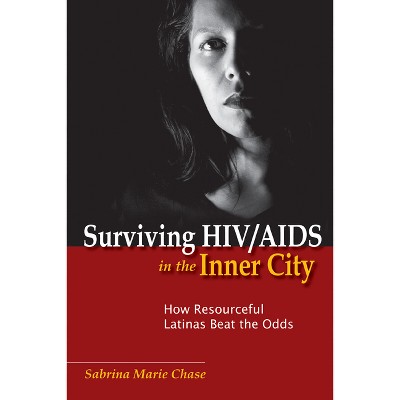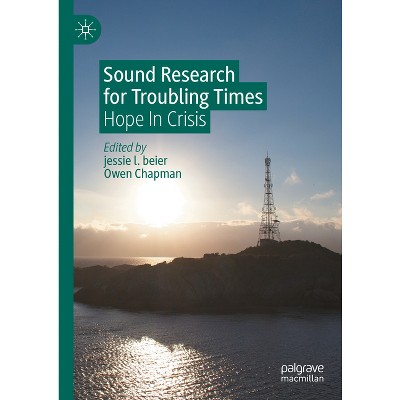Living with HIV in Post-Crisis Times - (Anthropology of Well-Being: Individual, Community, Society) by David a B Murray (Hardcover)

About this item
Highlights
- As global health organizations claim that the AIDS/HIVcrisis is nearing its end, Living with HIV in Post-Crisis Times: Beyond the Endgame examines how people living with HIV navigate changes in the management and control of the HIV pandemic.
- About the Author: David A.B. Murray is professor of anthropology and sexuality studies at York University.
- 254 Pages
- Social Science, Disease & Health Issues
- Series Name: Anthropology of Well-Being: Individual, Community, Society
Description
About the Book
As global health organizations claim that the AIDS/HIV crisis is nearing its end, Living with HIV in Post-Crisis Times: Beyond the Endgame examines how people living with HIV navigate changes in the management and control of the HIV pandemic.Book Synopsis
As global health organizations claim that the AIDS/HIVcrisis is nearing its end, Living with HIV in Post-Crisis Times: Beyond the Endgame examines how people living with HIV navigate changes in the management and control of the HIV pandemic.
Review Quotes
This edited collection of ethnographic research reports from 11 contributors around the globe makes the case that biomedical treatment to prolong life and reduce transmission of HIV has not solved the HIV/AIDS crisis. Murray includes case studies from Egypt, Uganda, India, Africa, Japan, Jamaica, and Canada that discuss numerous problems: lack of access to resources; drug shortages and limited distribution; treatment non-compliance; stigma and discrimination; dwindling financial support for fewer programs; staff shortages; inadequate follow-up; aging patients and long-term toxic drug side effects; increased alcohol use; girls and women as victims of sexual violence and/or abandonment/widowhood; food insecurity and need for nutritional counseling; and problems of poor migrant populations such as unstable housing, underemployment, and the like. Contributing authors also share information on some positive efforts and pilot programs: women-centered networks and "Mentor Moms" in Jamaica; Ugandan residential treatment and a school for children with advanced HIV infection who are eventually reintegrated into home communities; and a Canadian/West African EBOLA vaccine clinical trial conducted among HIV] immunocompromised individuals. The chapters include extensive notes and references[.] Recommended. Upper-division undergraduates. Graduate students, faculty, and professionals.
Anyone who thinks the end of HIV/AIDS has arrived needs to read this book. Through rich ethnographies of the response to HIV in countries around the globe, this volume forcefully demonstrates the profound limitation of Global North assumptions about the normalization of HIV. The book is a potent reminder of the ongoing struggles faced by communities of people living with HIV, the limitations of biomedical 'solutions' to HIV/AIDS, and the social, political, and economic inequalities in the global HIV/AIDS response. It makes an indelible contribution to critical social science understandings of HIV in our present.
As the world enters the fifth decade of the HIV/AIDS pandemic, this volume offers an essential reminder that HIV is not over, particularly for the many activist and patient communities who risk being further marginalized by such discourses. These varied and ethnographically rich chapters provide a powerful record of where, how, and for whom HIV persists--and at what cost.
This insightful, moving, and often gripping edited volume makes a critical intervention into the hegemonic biomedical framing of HIV as a chronic, manageable condition. The contributors elegantly demonstrate that, from India to Egypt to Japan, access to antiretroviral treatment and appropriate care is often fragile and uneven, that lives continue to be cut tragically short by AIDS-related illnesses, and that health bureaucracies themselves are often significant barriers to antiretroviral adherence and effective self-care. The volume showcases the work of talented new researchers who are investigating cutting-edge topics, such as how HIV disclosure is managed and experienced among children, how governments deploy claims about having discovered a 'cure' in order to whip up nationalist sentiments, and how people living with HIV endure a kind of erasure when their experiences do not align with current HIV optimism. The contributors think deeply about what it means to live with a 'chronic' illness, showing that chronicity is not the unspooling of flat, uneventful time, but instead is often experienced as unpredictable and punctuated by near-fatal crises. Also notable in this collection is the rich analysis of alternative forms of community, often forged by their members to provide the experiential and embodied knowledge, support, and care that formal, technocratic health services fail to deliver. Bookended by an incisive Introduction and by two powerful and thought-provoking concluding chapters, this collection makes a highly significant contribution to the anthropology of HIV and AIDS.
About the Author
David A.B. Murray is professor of anthropology and sexuality studies at York University.










